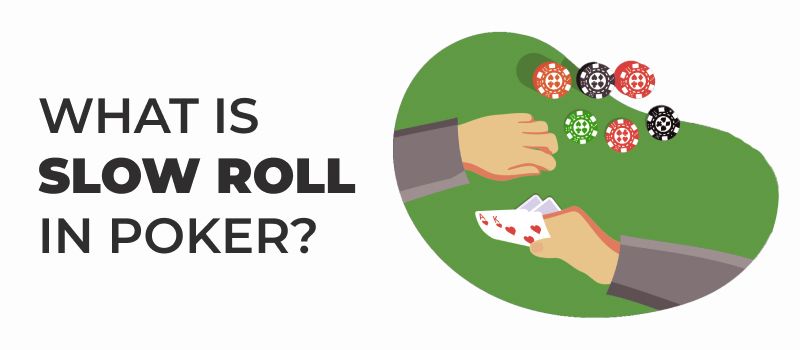In poker, slow rolling can challenge your composure and is often perceived as unsportsmanlike conduct. Many players view it as an affront to their rivals, deliberately dragging out the moment before revealing a winning hand. Some may leverage this tactic as a mental game to elevate pressure on opponents and cultivate a fearsome reputation at the table. In this discussion, we will explore the psychological underpinnings of slow rolling and offer practical tips to navigate such scenarios. Canadian casinos .
Understanding the concept of Slow Roll in Poker and strategies to evade it.
What is Slow Rolling In Poker?

The practice involves deliberately taking an excessive amount of time to showcase your winning hand when you are confident that no one else at the table can surpass it. This typically occurs after the betting rounds have finished and players are prepared for the final reveal. Rather than quickly displaying their cards, the player will linger, heightening the suspense for their fellow competitors.
There are various ways to conduct a slow roll—some individuals might wear a smug smile while revealing their winning hand, while others may adopt a seemingly defeated approach, saying, \"Oh no, I lost—just kidding, I actually won!\"
Why is Slow roll a bad tactic?
Though a few players enjoy the thrill of this maneuver, the vast majority tend to steer clear of it, recognizing the potential annoyance it can create for their peers. Here are four key reasons why employing a slow roll is generally seen as unacceptable:
It is disrespectful to your opponent.
By engaging in slow rolling, you convey to your opponent that they don’t deserve a swift and transparent reveal of your hand, which can come off as disrespectful and conceited. Poker is fundamentally a game of strategy, but it’s vital to uphold the principles of good sportsmanship.
It can backfire on you.
While using a slow roll might provide a fleeting sense of superiority, it could adversely affect how your fellow players view you throughout the rest of the game. No matter how confident you feel about your hand, you can never truly know what your adversaries are holding.
It goes against the spirit of the game.
Employing the slow roll contravenes the foundational principles of fairness and integrity within the game, creating a tense environment at the table. It diverts from the core attraction of poker: outsmarting your opponents through skillful play and strategy, rather than through poor conduct.
This behavior can detract from the overall enjoyment of the game for all participants.
The added pressure from slow rolling can not only irritate fellow players, but it also prolongs the game unnecessarily. Repeated instances of slow rolling can tarnish any friendly atmosphere and indicate a lack of respect for others’ time.
How to Recognize the Use of Slow Roll?
There are several indicators that can help you identify a slow roller at your poker table. Below, we've assembled some tips to assist you in recognizing one.
Frequent Card Checking. If you observe a player persistently revisiting their cards, this may hint at a strong hand and could lead to a slow roll.
General Conduct. Certain communication styles, body language, and behaviors—such as sarcastic remarks, drawn-out pauses, or excessive eye contact—can indicate a player may be slow rolling. It helps to pay attention to the overall demeanor of the participants.
Emotional Manipulation. Slow rollers often toy with your emotions during the game, not only by prolonging their card reveal but also by goading you with their facial expressions or remarks.
Last to Show. If a player consistently reveals their hand last in showdowns, this might be a telltale sign of a slow roller.
A Famous Slow Roll Example
This incident is one of the most notorious examples online, illustrating how poorly a slow roll can unfold.
During the Irish Open, the final table featured eight players, all of whom had conquered a massive field to secure substantial prize money and a chance at a coveted title.
Andreas Gann found himself in an excellent position with an ace-high flush, holding the king of diamonds—a situation commonly known as having the nuts. His opponent, the renowned Irish poker player Donnacha O'Dea, had two pairs. It appeared inevitable that both players would see their chips enter the pot for a face-off, and O'Dea was quick to push his opponent all-in.
Unexpectedly, Gann took almost a minute to make the call, leading to a highly tense moment.
Yet, an interesting twist awaited. O'Dea hit a Full House on the river, sending Gann home empty-handed.
Commentators at the time observed, \"This is absolutely outrageous.\" You can check out the footage at the end of this article.
Help us to 100K Subscribers - http://goo.gl/Bvsafo If you are reading this, comment.. ● Watch other Videos: ► Bluffs Gone Wrong - https://youtu.be/ffawyLHW4fY ► Phil Ivey Wins $2,200,000 - https://youtu.be/GvSFls_LtkA ► Top Straight Flushes - https://youtu.be/XEe3LCL34Tg ► Best Poker Quads - https://youtu.be/NaA4CsAzdNM
Slow rolling VS Hollywooding
Slow rolling is often confused with the tactic known as Hollywooding, but the two concepts diverge significantly. Take a look at the comparisons below to uncover their primary distinctions.
Slow Rolling
- Slow rolling can only take place at showdown, with no bearing on the outcome of the hand.
- It typically leads to frustration and ire from other players at the table.
- Regarded as one of the rudest behaviors within poker culture.
- Less common in professional games.
- It can harm a player’s standing in the eyes of others at the table.
Hollywooding
- Players wantonly embellish their choices as part of a bluff.
- This can occur at any point in a hand, successfully misleading others if executed effectively.
- Seen as poor etiquette if done repeatedly without thoughtful consideration.
- Slow play is a legitimate tactic that may affect the outcome.
- When executed appropriately, it can enhance your confidence and standing within the game.
Summary
In summary, a slow roll in poker refers to the deliberate delay in revealing a winning hand, which can lead to conflict as some players view this behavior as detrimental to the game's integrity, while others regard it as a strategic psychological maneuver. Fortunately, in the realm of online gambling, such tactics are less prevalent in live poker settings or in games relying on random number generation, leading to a more relaxed environment. Make use of our Canadian online casino reviews to pinpoint trustworthy platforms that provide safer and fairer gaming experiences.
FAQ
Is slow rolling in violation of official poker regulations?
While slow rolling isn’t officially banned by poker rules, it does breach the unwritten codes of good sportsmanship, which most players adhere to.
Is Slow Rolling Ever Acceptable?
Although permitted by poker regulations, it’s often scorned by professionals and is more commonly found in casual settings.
What are the repercussions of slow rolling?
Typically, slow rollers don’t receive much camaraderie from their fellow players, as they make others wait unnecessarily, which can severely impact their reputation at the table.
Why Do Players Slow Roll?
Slow rolling often occurs when a player feels secure in their strong hand and draws attention to it unnecessarily. Alternatively, it may happen when a player has lost and seeks to annoy others by applying extra pressure.
What separates a slow roll from a slow play?
While slow rolling is used derisively to tease and provoke opponents, slow play serves as a genuine tactic aimed at tricking other players and gaining greater value.
Should You Use The Slow Roll In Poker?
The importance of good sportsmanship cannot be overstated; avoiding slow rolling helps to preserve respect and a positive ambiance among players.











